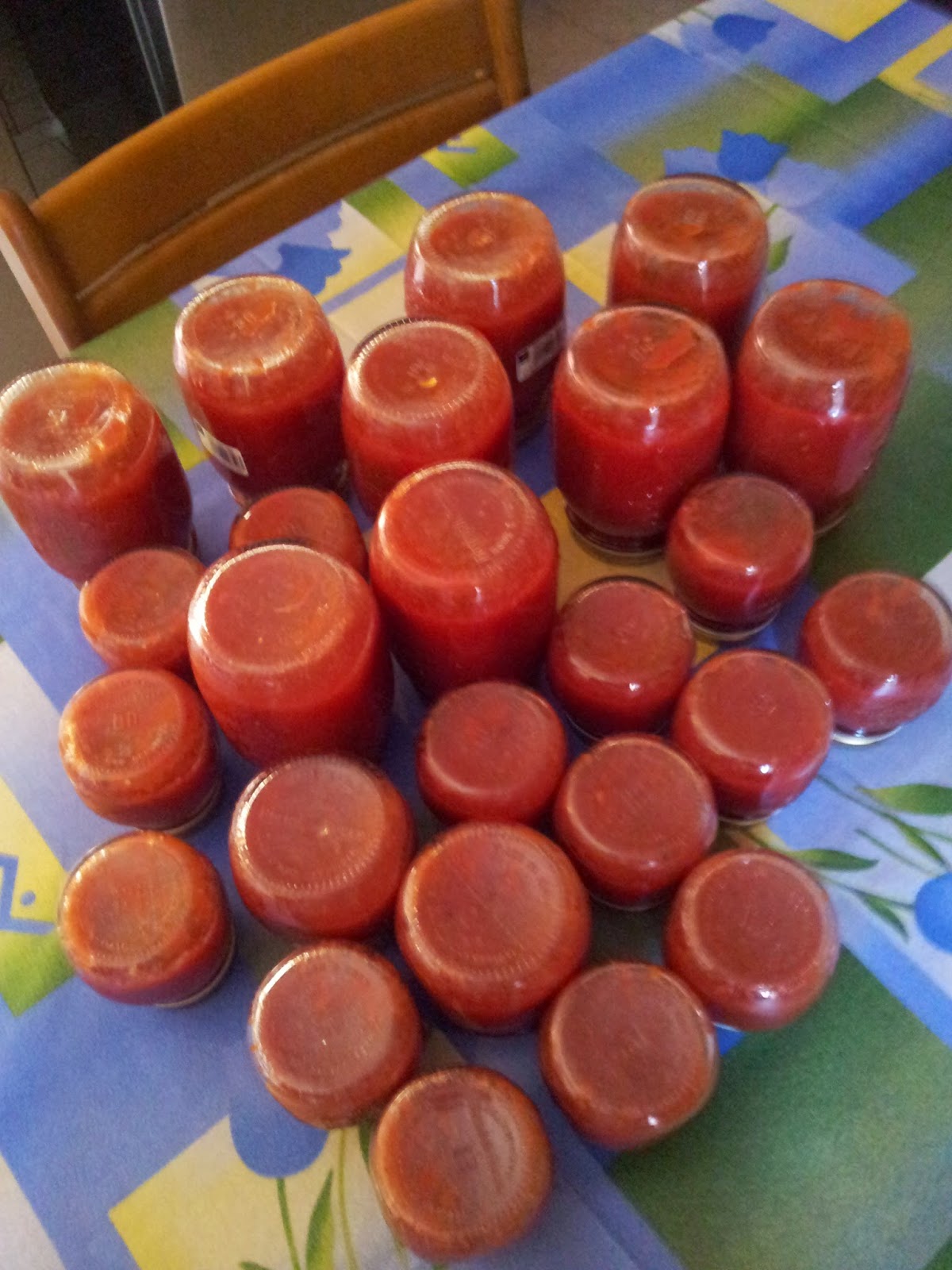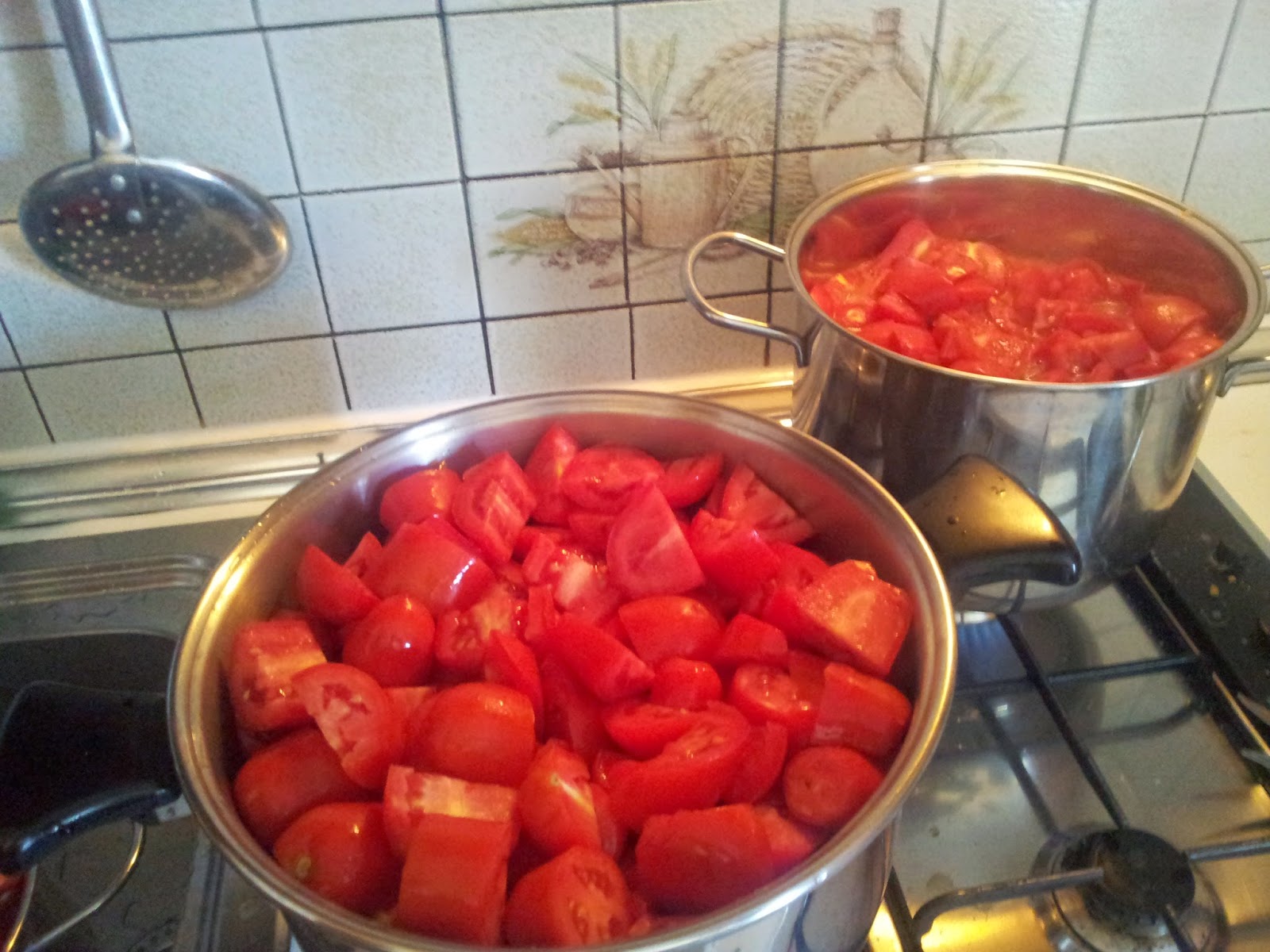Per carita`, in stagione si trova anche in Germania, tondo come una mela, fatto quasi con lo stampino, un po' acquoso ma duro, e difficilmente a meno di 3 euro al chilo; ma un po' piu` a sud verso meta` agosto piovono letteralmente dal cielo, fuoriesono dai tombini, riempono di rosso la gia` rigogliosa vegetazione dei cortili, e dalle cucine quando cuoce si riversa per le strade il suo odore trascinante. Stiamo parlando ovviamente del pomodoro, questo frutto quasi magico proveniente dal "mondo nuovo" che ha finito per essere icona della cucina del Mediterraneo.
Che sia il piccolo tondo aspro Pachino, o un gigantesco Cuore di bue re delle insalate, o l'oblungo San Marzano da conserva, dalle mie parti chiamato butalina... Per inciso lontano dalle mie parti tale nome puo` tirarsi dietro un'imprecazione contro Garibaldi i Savoia e la dannata unificazione italiana...
Well, in the right season you find it also in Germany, rounded like an apple, made almost with a mould, a little watery but hard, and hardly for less than 3 euros pro kilo; but a little souther around middle august they literally rain from the heavens, they pour out from the drains, they fill with their redness the already flourishing vegetation of the courtyards, and from the kitchens when it is cooked its drawing smell spills out in the streets. We are of course talking about the tomato, this almost magical fruit coming from the "new world" which ended up being the icon of the mediterranean kitchen.
It can be the small spherical harsh "Pachino" (a town in Sicily), or a huge "Cuore di bue" (heart of ox) king of the salads, or an oblung "San Marzano" (a town in Campania) for conserves, that where I come from is called "Butalina"... By the way far from where I come from such a name can invoke an imprecation against Garibaldi the Savoia royal family and the damned unification of Italy...
 |
| pomodoro tipo San Marzano tomato of the kind San Marzano |
Le conserve appunto; ricordo la vicina di casa calabrese, il suo pentolone gigantesco da strega, quell'aroma generosamente sprigionato dalla bollitura, e poi barattoli barattoli e barattoli, e questa specie di rituale mistico a cadenza annuale da famiglia allargata. E perche` noi no, o non piu`? Ho voluto recuparare questa tradizione, dettata piu` che altro prima dall'esigenza e poi dal buon senso, piuttosto che da qualunque desiderio di virtuosismo. Perche` devo comprare lattine ogni settimana al supermercato? E ingurgitare prodotti nella migliore delle ipotesi mediocri? Perche` e` piu` sicuro? Vaffanculo il botulino e tutta l'ansia che ti mettono i giornali quando succede qualcosa a causa di queste obsolete e pericolose pratiche casalinghe, indegne di una civilta` evuluta e frutto solo della miseria. Si lava bene il materiale il luogo e se stessi, si sterilizza e si chiude sotto vuoto i barattoli, come si deve, come si e` sempre fatto, e via.
Conserves indeed; I remember the neighbour from Calabria, her huge witchy cauldron, that flavour generously emanated by the boling, and then jars jars and jars, and this kind of yearly large family mystical ritual. And why we do not, or not anymore? I wanted to recover such a tradition, dictated before mostly by esigence and then later by common sense, much more than by any desire of virtuosism. Why should I buy every week tins in the supermarket? And swallow products which are mediocre in the best of the hypothesis? Because it is safer? Fuck off botulinus and all the anxiety the newspapers put on you when something happens due to these obsolete and dangerous hausehold habits, which are unworthy for advanced civilization and reult only of misery. You wash properly the material the place and yourself, you sterilize and close under vacuum the jars, like one must, like one has always done, and let's go.
 |
| un tipico rovescio di pomodori a typical tomato downpour |
Bancone al lato di uno stradone di periferia, dall'altra parte i fabbricati giganteschi di una nota industria meccanica, dietro quel miscuglio di cascine case nuove case vecchie campi incolti campi coltivati fabbrichette che non e` ne` campagna ne` citta` ma quell'enorme luogo surreale che vi giace un mezzo. Quanto e` una cassa? 25 chili, a 0.65 centesimi al chilo. Me ne da una. Si vergogni lei, la signora prima ne ha presi 3 quintali e ci ha riempito la station wagon. Quasi gli dicevo, ma sa e` praticamente la prima volta.
In realta` la nonna si ricordava bene di quando li faceva ancora; diceva da qualche parte ho ancora il pentolone ma chissa` dove. E` stata una gioia tagliare i pomodori assieme, guardare i pentoloni non tanto -oni ribollire, e poi a meta` cottura passarli con il passaverdura.
Poche decine di barattoli non credo che mi basteranno per tutto l'anno futuro.
Stand aside a wide road in the suburbs, on the other side the huge buildings of a well-known mechanical industry, behind that mixture of farms new houses old houses fallow fields small manufactures that is neither countryside nor city but that enormous surreal place that lies in between. How much is a case? 25 kilos, 0.65 cents pro kilo.I get a case. You should be ashamed, the woman before you took 300kg and filled the station wagon. I was about to say, you know, practically it is the first time.
Actually the grandmother remembered very well when she was still making it; she said somewhere I still have the big pot but who knows where. It was a joy to cut the tomatoes together, look at the not so big pots boiling, and pass them throught the rotary food mill half the way.
A few dozens of jars I don't think they will be enough for all next year.


Nessun commento:
Posta un commento